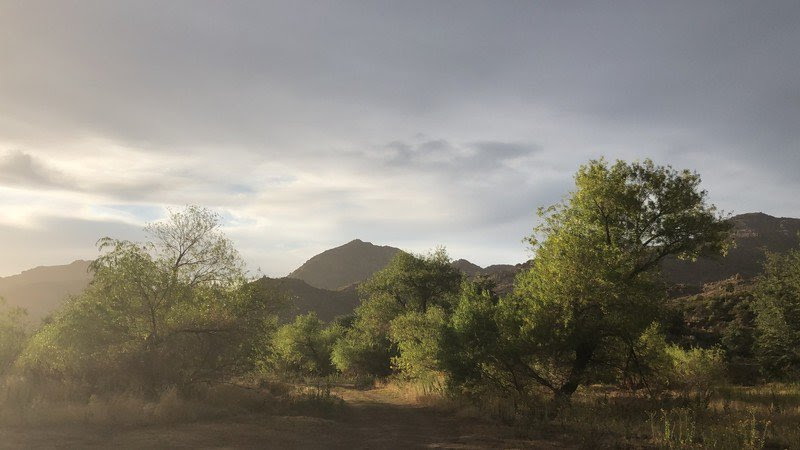
- Details
- By Native News Online Staff
Two years after the Center for Biological Diversity filed a lawsuit, the U.S. Forest Service has released its appraisals for the proposed Oak Flat land exchange and mining project in Arizona.
As anticipated, the appraisals reveal a significant imbalance: if the land swap proceeds, Resolution Copper would gain land worth billions more than what it is offering in return. Oak Flat — located east of Phoenix — is not only the center of the proposed mine, but also a sacred Indigenous site, a beloved campground, and a globally recognized destination for outdoor recreation.
“We’ve long known the public would be screwed over by this terrible land swap, and now we’ve got the receipts,” said Marc Fink, a senior attorney at the Center. “Handing Oak Flat over to Resolution Copper would be a catastrophe for the Tribes in the region and an environmental disaster for Arizona. The appraisal shows it’d also be a multibillion-dollar gift to this international mining company. The land swap is a horrible deal for the American people and it should be scrapped.”
Resolution Copper claims its proposed mine beneath Oak Flat and surrounding federal lands could yield up to 40 billion pounds of copper over 40 years. At current market prices, that copper would be worth more than $150 billion.
But newly released appraisals, made public Tuesday, show a stark imbalance in the proposed land exchange. Resolution would hand over private lands valued at just $9.8 million in exchange for over 2,000 acres of federal public land sitting atop one of the world’s largest untapped copper deposits. The federal government would receive no royalties from the extracted copper, which documents indicate would likely be smelted in Southeast Asia.
The release of the appraisals follows a 2023 lawsuit by the Center for Biological Diversity after the U.S. Forest Service failed to comply with a Freedom of Information Act request. Initially, the agency responded with a heavily redacted summary. But after two years of litigation, a federal court ordered the release of the full appraisals in March.
The timing of the release is notable: it comes just one week after the Trump administration announced plans to push the land swap forward by publishing a final environmental review within 60 days—a move paused under President Biden.
The San Carlos Apache Tribe and Apache Stronghold are actively challenging the land exchange in court, with Apache Stronghold also petitioning the U.S. Supreme Court for review. Oak Flat, the proposed mine site, is a place of profound spiritual significance to the San Carlos Apache Tribe and other Indigenous communities.
“This land is worth billions, and Resolution should be paying a fair price, as required by law,” said Fink. “Instead, Trump is handing over a sacred site to an international mining giant for pennies—and calling it business savvy? No wonder the Forest Service wanted to keep this appraisal under wraps.”
In addition to its cultural importance, Oak Flat is home to endangered species including ocelots and the Arizona hedgehog cactus. Mining giant Rio Tinto plans to extract copper using a block-cave method nearly 7,000 feet underground. The process would generate massive amounts of toxic waste, spread across thousands of acres of public land, and ultimately leave behind a crater up to two miles wide and 1,000 feet deep.
More Stories Like This
Gwich'in Tribal Governments Submit Comments Challenging Fish and Wildlife Service's Inadequate Environmental Review of Arctic Refuge Snow RoadRappahannock Tribe Challenges 9M-Gallon Water Plan
Feds release draft long-term plans for Colorado River management
Apache Leader Walks 60 Miles to Court Hearing That Will Decide Fate of Sacred Oak Flat
Rappahannock Tribe Raises Sovereignty and Environmental Concerns Over Caroline County Water Permit
Help us defend tribal sovereignty.
At Native News Online, our mission is rooted in telling the stories that strengthen sovereignty and uplift Indigenous voices — not just at year’s end, but every single day.
Because of your generosity last year, we were able to keep our reporters on the ground in tribal communities, at national gatherings and in the halls of Congress — covering the issues that matter most to Indian Country: sovereignty, culture, education, health and economic opportunity.
That support sustained us through a tough year in 2025. Now, as we look to the year ahead, we need your help right now to ensure warrior journalism remains strong — reporting that defends tribal sovereignty, amplifies Native truth, and holds power accountable.
 The stakes couldn't be higher. Your support keeps Native voices heard, Native stories told and Native sovereignty defended.
The stakes couldn't be higher. Your support keeps Native voices heard, Native stories told and Native sovereignty defended.
Stand with Warrior Journalism today.
Levi Rickert (Potawatomi), Editor & Publisher


